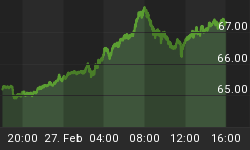As expected, the Riksbank today left its key repo rate at 3.25% and struck the same relativelydovish tone that it adopted after February's 25bp rate hike. The bank once again noted that, "over the coming months the repo rate will need to be raised by 0.25 percentage point ... After that it will probably be possible to pause before making a further increase." The bank published its rate path forecast for the first time in February, indicating that it expected the repo rate to be at 3.5% by the end of this year, nudging upward to average 3.6% in Q1 2008 and 3.7% in Q1 2009. However, we think the path of tightening will end up being a little steeper.
The Riksbank targets underlying inflation (UND1X, ex-indirect taxes and interest rates) of 2.0% over a two-year forecast horizon. As we've noted before (see Daily Global Commentary, December 15: Sweden's Riksbank Continues On Its Tightening Path), although UND1X remains well below this level - coming in at just 1.3% in February - the Riksbank is concerned with where inflation will be two years from now. There are some signs that inflation may be starting to edge upward, with the headline rate reaching 2.0% last month. Hence, the central bank's forecast for gradual tightening.

In today's announcement the Riksbank warned that wage deals may fuel inflation. Indeed, industrial workers inked a bigger-than-expected three-year pay deal earlier this month and retail workers just did the same. The labor market continues to tighten, with the (unadjusted) jobless rate falling to 4.8% in February from 5.3% in January. The central bank had been assuming that an expanding labor supply would help to keep some slack in the job market and reduce inflationary pressures. While the labor force has been rising in recent months, February's 4.646 million was up only 1.15% on the year-earlier level, which does not seem like enough of an increase to keep inflationary pressures from other sources in check.

Overall, the economy is downright robust. Real GDP growth jumped 1.2% on the quarter and 4.7% on the year in Q4, taking 2006 growth to 4.4% - the fastest since the dot-com boom year of 1999 and the second-fastest since 1970. Evidence so far from the first quarter suggests that this pace continues. Business confidence remains strong and retail sales, though volatile, remain at a high level. The National Institute for Economic Research just raised its forecast for economic growth to 3.9% this year and 3.4% in 2008. The government is a tad more cautious, with growth forecasts of 3.7% and 3.3%, respectively. The Riksbank's latest forecast is for 3.5% growth this year slowing to just 2.9% in 2008 - we suspect these numbers will be revised upward in the coming months.

Meanwhile, with the fiscal surplus reportedly rising steadily as the booming economy generates strong revenue growth, Finance Minister Borg said recently he would consider additional income tax cuts in the 2008 budget. Coming on top of this year's cuts, that would give an additional kick to domestic demand going forward - something the central bank will likely take into account as it prepares its next set of interest rate forecasts (which will be included in the second Monetary Policy Report of the year, to be released June 20).
We suspect that, if the labor market and growth data continue on their recent trajectory, the Riksbank will sound a little more hawkish at the May 3-4 policy meeting, and will hike the repo rate to 3.50% on June 19-20. How soon the next tightening comes will depend on the data.















